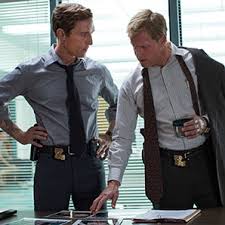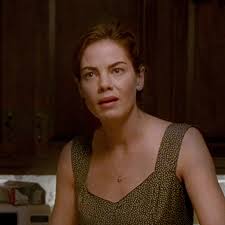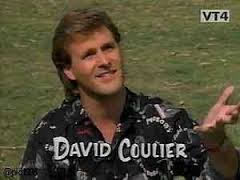Last week’s True Detective premiere was primarily concerned with introducing us to the desolate mindscape of McConaughey’s Rustin Cohle. This week does provide us some more of his depressing, violent origin story, and new wrinkles about his psychedelic-flashback souvenirs from his time as a narco mole. That’s a touch that should be silly and over-the-top, but is handled with such matter-of-fact beauty that I once again go with it. But “Seeing Things” is much more about digging further into Martin Hart’s psyche, and all the things that he doesn’t (or simply won’t) see there. Cohle is definitely still the defining force of the show’s personality, but he wears his damage on his sleeve, in both 1995 and 2012. His partner, meanwhile, has reserves of anger and ugliness that he does his best to keep hidden even from himself, and so the show has to take its time peeling back his surfaces.
“I think part of Rust’s problem was there was things he needed, that he couldn’t admit to,” Hart offers to the interviewing detectives. But I have this theory that if you want someone to tell you what their own biggest problem is, you could do worse than to point at someone else and ask them what they suppose that guy’s deal is. Hart clearly has desires and resentments that he won’t acknowledge. He is jealous of how his young girlfriend (who it must be said, has one of the most ri-goddamn-diculous bodies in even the storied history of pay cable T&A) spends her time away from him, but has to couch it in paternal protectiveness. He will sit in the car while his partner roughs up some hillbillies for directions, but offer neither help nor criticism. And he refuses to meet his wife’s complaints head on, using the job and her brittle relationship with her mother to deflect the argument away from anything he doesn’t want to talk about.
He also has reserves of anger hidden very close to the good ol’ boy surface, as he explodes at Cohle’s mild observation that he isn’t hiding the affair well. He even tries to warp that confrontation into a defense of his wife’s honor, not that Rust is entertaining that fiction, or remotely afraid of a middle-aged detective after what we learn he’s done before. He tells the 2012 detectives “I know who I am. And after all these years, there’s a victory in that.” But he doesn’t look victorious, with the cigarette constantly smoldering and that wispy wig and droopy moustache, drinking alone on nights off from working presumably at a bar.
Marty still does not seem to know who he is in 2012, as even in hindsight he justifies his drinking and adultery as for the good of the family, allowing him to exorcise some of those generic cop show demons and be a better overall family man when he does get around to coming home (to his daughters setting up gang-rape tableaus with their Barbies, in the episode’s most unsettling beat). I think he actually does believe that, or at least did in 1995; we haven’t heard any mention of his current family situation in those interview segments. The girls would presumably be grown and gone in any case, but at this point I’d hazard a guess that while he may be married, it’s not to Michelle Monaghan.
I feel like I should probably mention the actual case progress at some point, but there isn’t a ton going on there. The guys get threatened with losing the case to the new occult task force, but mostly just do basic legwork. What they find out about the victim could probably have been guessed by anyone who has seen a fair amount of serial killer fiction and/or CSI: childhood defined by poverty and abuse, drug problems, fell into prostitution, met a mysterious new man shortly before being killed. What makes True Detective distinctive thus far is not the content of those beats, but the stylistic way they are depicted: the quiet despair of the rural settings, the subtle hallucinatory touches, and the simmering tension between the two men walking these familiar beats. I am only mildly interested in whether they catch the real killer in the “present day”, but I’ll tune in next week to see how these guys manage to continue to share those long car rides through the bayou back in the 90’s (apropos of nothing, I’m eagerly waiting for the moment when Woody turns on the radio to relieve one of those awkward silences and is greeting with an endless, period-appropriate loop of Alanis Morrissette’s “You Oughta Know”).
Prior recaps can be found in here.



